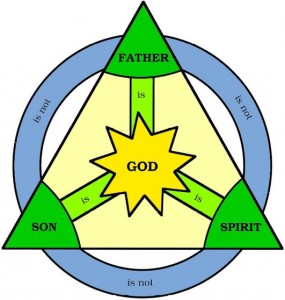I did a search through my entire theological library on “The problem of the trinity.” It had 23 different articles that referred to the trinity as a problem. I think that is a major problem (no pun intended!). Gabriel Marcel made a  very helpful distinction between a problem and a mystery. He suggests that problems demand a solution, whereas mysteries call for meditation. This clarifies the issues surrounding any discussion regarding the trinity. Marcel goes on to suggest that problems often demand extensive study (like knowing words to solve a crossword puzzle), but mysteries demand a different kind of reflection. Geisler says it requires “intensive” study as opposed to “extensive” study. Intensive study focuses upon the fact, extensive study seeks new facts.
very helpful distinction between a problem and a mystery. He suggests that problems demand a solution, whereas mysteries call for meditation. This clarifies the issues surrounding any discussion regarding the trinity. Marcel goes on to suggest that problems often demand extensive study (like knowing words to solve a crossword puzzle), but mysteries demand a different kind of reflection. Geisler says it requires “intensive” study as opposed to “extensive” study. Intensive study focuses upon the fact, extensive study seeks new facts.
Geisler’s summary is interesting. He says, “In view of this distinction, the Trinity should be treated as a mystery, not a problem. Once the basic elements are understood, we should not attempt to unscrew the inscrutable. We should not analyze it, but admire it; we should not dissect it, but devote ourselves to it. It is an object of worship, not scholarship. As has been well said, if one tries to understand it completely (as a problem), he may lose his mind, and if he does not believe it sincerely, he may lose his soul! Once we understand God’s attributes and ineffable nature, we need more reverence, not more research.”
The Bible uses the term “mystery” several times. But it doesn’t mean what we usually think of when we hear the term. J. V. McGee said, “What is a mystery in Scripture? It is not a whodunit or a mystery story, and it is not something you wonder about, like, Was it the butler who committed the crime? It is not something Agatha Christie wrote or a Sherlock Holmes story, by any means. A mystery in Scripture means that God is revealing something that, up to that time, He had not revealed.” McGee goes on to say that one of the key ingredients of a biblical mystery is that “…it cannot be discovered by human agencies, for it is always a revelation from God.” One of the more profound mysteries in Scripture is the mystery of the resurrection. Paul says, in 1 Corinthians 15:51-52, “Behold! I tell you a mystery. We shall not all sleep, but we shall all be changed, in a moment, in the twinkling of an eye, at the last trumpet. For the trumpet will sound, and the dead will be raised imperishable, and we shall be changed.” Mysteries are to be believed, not understood!